Fairouz: Lebanon's Musical Diva
VerifiedAdded on 2020/05/11
|8
|1723
|195
AI Summary
This assignment analyzes the life and career of Fairouz, a celebrated Lebanese singer. It examines her musical contributions, her enduring love for a unified Lebanon, and the controversies she faced throughout her career. From accusations of collaborating with Syrian intelligence to legal battles over song copyrights, the analysis sheds light on the complex relationship between art, politics, and national identity in Lebanon.
Contribute Materials
Your contribution can guide someone’s learning journey. Share your
documents today.
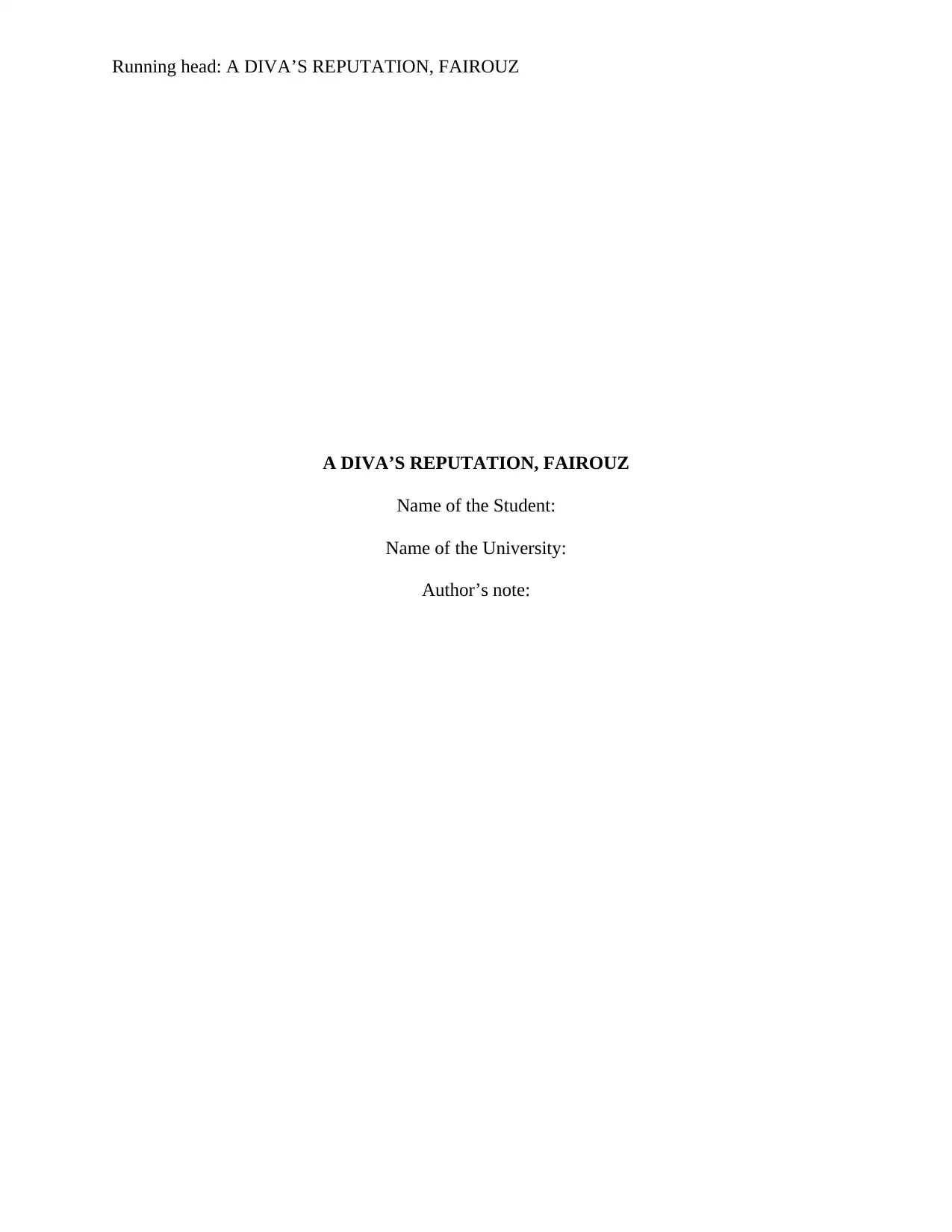
Running head: A DIVA’S REPUTATION, FAIROUZ
A DIVA’S REPUTATION, FAIROUZ
Name of the Student:
Name of the University:
Author’s note:
A DIVA’S REPUTATION, FAIROUZ
Name of the Student:
Name of the University:
Author’s note:
Secure Best Marks with AI Grader
Need help grading? Try our AI Grader for instant feedback on your assignments.
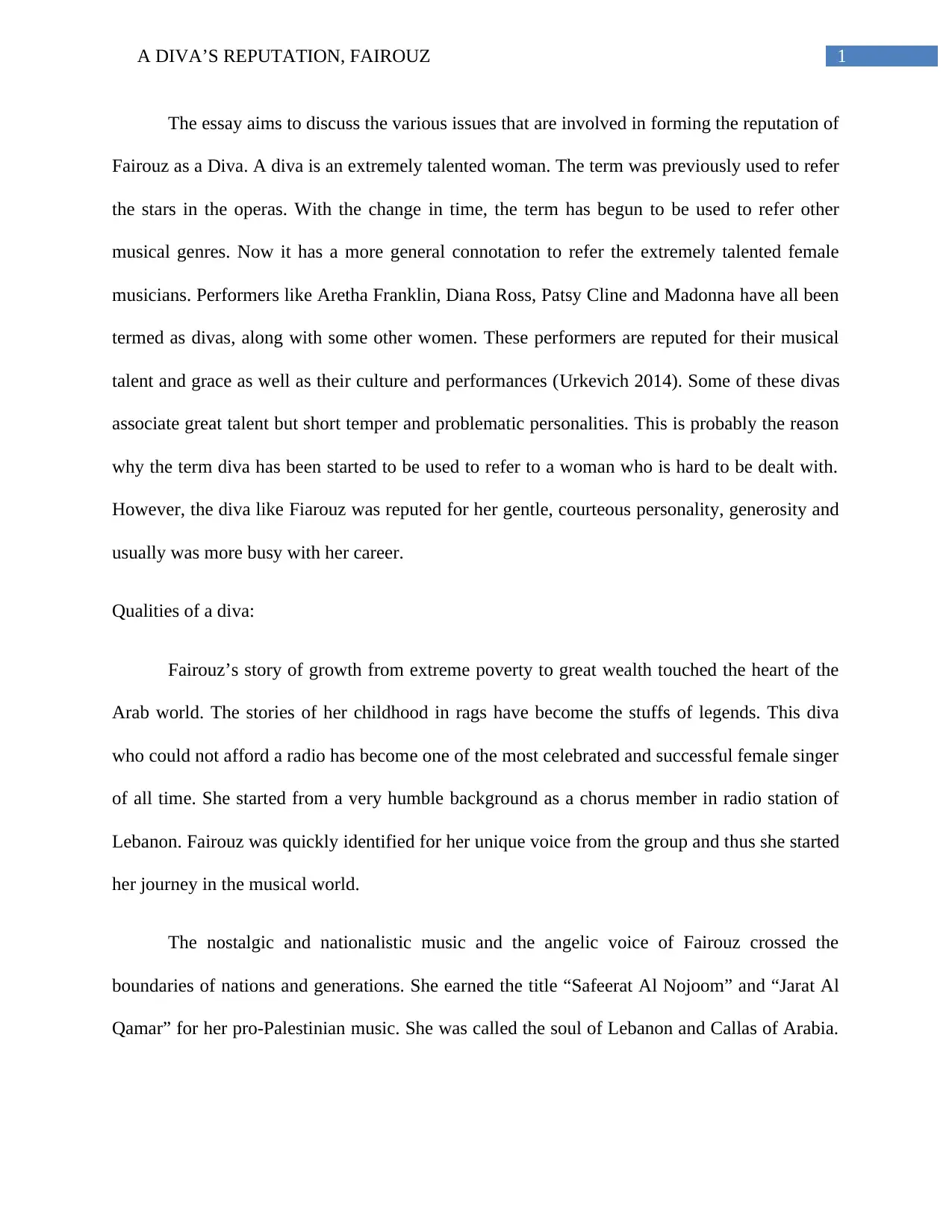
1A DIVA’S REPUTATION, FAIROUZ
The essay aims to discuss the various issues that are involved in forming the reputation of
Fairouz as a Diva. A diva is an extremely talented woman. The term was previously used to refer
the stars in the operas. With the change in time, the term has begun to be used to refer other
musical genres. Now it has a more general connotation to refer the extremely talented female
musicians. Performers like Aretha Franklin, Diana Ross, Patsy Cline and Madonna have all been
termed as divas, along with some other women. These performers are reputed for their musical
talent and grace as well as their culture and performances (Urkevich 2014). Some of these divas
associate great talent but short temper and problematic personalities. This is probably the reason
why the term diva has been started to be used to refer to a woman who is hard to be dealt with.
However, the diva like Fiarouz was reputed for her gentle, courteous personality, generosity and
usually was more busy with her career.
Qualities of a diva:
Fairouz’s story of growth from extreme poverty to great wealth touched the heart of the
Arab world. The stories of her childhood in rags have become the stuffs of legends. This diva
who could not afford a radio has become one of the most celebrated and successful female singer
of all time. She started from a very humble background as a chorus member in radio station of
Lebanon. Fairouz was quickly identified for her unique voice from the group and thus she started
her journey in the musical world.
The nostalgic and nationalistic music and the angelic voice of Fairouz crossed the
boundaries of nations and generations. She earned the title “Safeerat Al Nojoom” and “Jarat Al
Qamar” for her pro-Palestinian music. She was called the soul of Lebanon and Callas of Arabia.
The essay aims to discuss the various issues that are involved in forming the reputation of
Fairouz as a Diva. A diva is an extremely talented woman. The term was previously used to refer
the stars in the operas. With the change in time, the term has begun to be used to refer other
musical genres. Now it has a more general connotation to refer the extremely talented female
musicians. Performers like Aretha Franklin, Diana Ross, Patsy Cline and Madonna have all been
termed as divas, along with some other women. These performers are reputed for their musical
talent and grace as well as their culture and performances (Urkevich 2014). Some of these divas
associate great talent but short temper and problematic personalities. This is probably the reason
why the term diva has been started to be used to refer to a woman who is hard to be dealt with.
However, the diva like Fiarouz was reputed for her gentle, courteous personality, generosity and
usually was more busy with her career.
Qualities of a diva:
Fairouz’s story of growth from extreme poverty to great wealth touched the heart of the
Arab world. The stories of her childhood in rags have become the stuffs of legends. This diva
who could not afford a radio has become one of the most celebrated and successful female singer
of all time. She started from a very humble background as a chorus member in radio station of
Lebanon. Fairouz was quickly identified for her unique voice from the group and thus she started
her journey in the musical world.
The nostalgic and nationalistic music and the angelic voice of Fairouz crossed the
boundaries of nations and generations. She earned the title “Safeerat Al Nojoom” and “Jarat Al
Qamar” for her pro-Palestinian music. She was called the soul of Lebanon and Callas of Arabia.
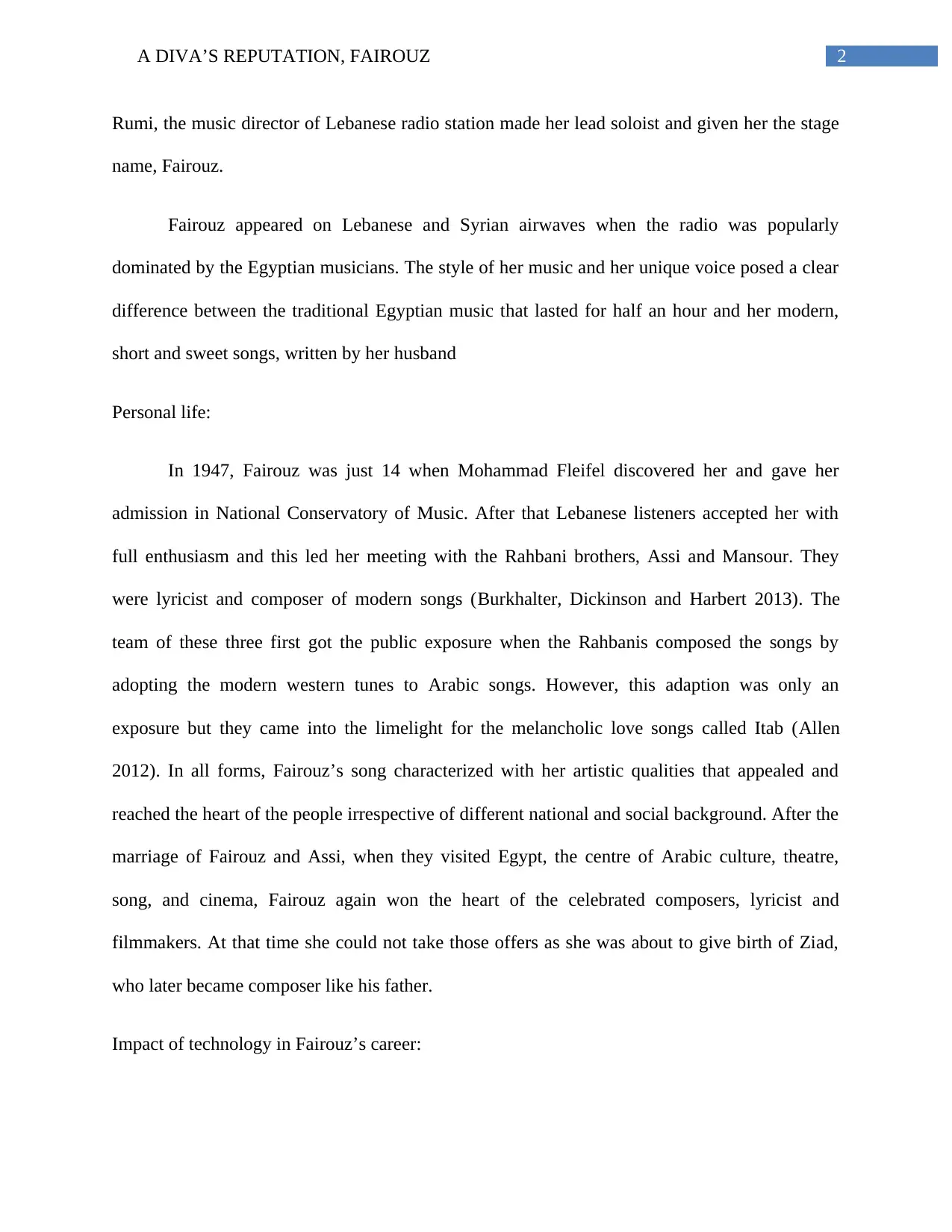
2A DIVA’S REPUTATION, FAIROUZ
Rumi, the music director of Lebanese radio station made her lead soloist and given her the stage
name, Fairouz.
Fairouz appeared on Lebanese and Syrian airwaves when the radio was popularly
dominated by the Egyptian musicians. The style of her music and her unique voice posed a clear
difference between the traditional Egyptian music that lasted for half an hour and her modern,
short and sweet songs, written by her husband
Personal life:
In 1947, Fairouz was just 14 when Mohammad Fleifel discovered her and gave her
admission in National Conservatory of Music. After that Lebanese listeners accepted her with
full enthusiasm and this led her meeting with the Rahbani brothers, Assi and Mansour. They
were lyricist and composer of modern songs (Burkhalter, Dickinson and Harbert 2013). The
team of these three first got the public exposure when the Rahbanis composed the songs by
adopting the modern western tunes to Arabic songs. However, this adaption was only an
exposure but they came into the limelight for the melancholic love songs called Itab (Allen
2012). In all forms, Fairouz’s song characterized with her artistic qualities that appealed and
reached the heart of the people irrespective of different national and social background. After the
marriage of Fairouz and Assi, when they visited Egypt, the centre of Arabic culture, theatre,
song, and cinema, Fairouz again won the heart of the celebrated composers, lyricist and
filmmakers. At that time she could not take those offers as she was about to give birth of Ziad,
who later became composer like his father.
Impact of technology in Fairouz’s career:
Rumi, the music director of Lebanese radio station made her lead soloist and given her the stage
name, Fairouz.
Fairouz appeared on Lebanese and Syrian airwaves when the radio was popularly
dominated by the Egyptian musicians. The style of her music and her unique voice posed a clear
difference between the traditional Egyptian music that lasted for half an hour and her modern,
short and sweet songs, written by her husband
Personal life:
In 1947, Fairouz was just 14 when Mohammad Fleifel discovered her and gave her
admission in National Conservatory of Music. After that Lebanese listeners accepted her with
full enthusiasm and this led her meeting with the Rahbani brothers, Assi and Mansour. They
were lyricist and composer of modern songs (Burkhalter, Dickinson and Harbert 2013). The
team of these three first got the public exposure when the Rahbanis composed the songs by
adopting the modern western tunes to Arabic songs. However, this adaption was only an
exposure but they came into the limelight for the melancholic love songs called Itab (Allen
2012). In all forms, Fairouz’s song characterized with her artistic qualities that appealed and
reached the heart of the people irrespective of different national and social background. After the
marriage of Fairouz and Assi, when they visited Egypt, the centre of Arabic culture, theatre,
song, and cinema, Fairouz again won the heart of the celebrated composers, lyricist and
filmmakers. At that time she could not take those offers as she was about to give birth of Ziad,
who later became composer like his father.
Impact of technology in Fairouz’s career:
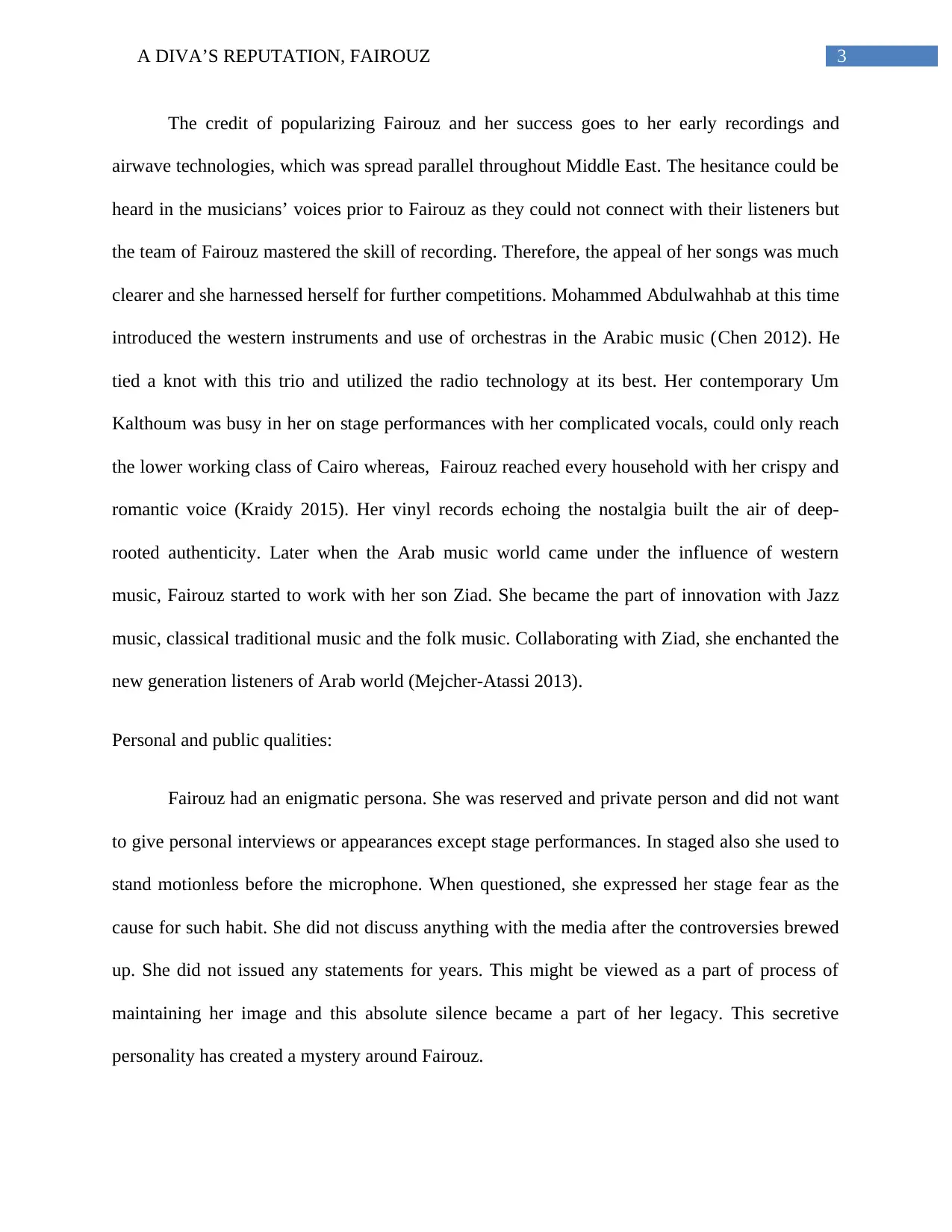
3A DIVA’S REPUTATION, FAIROUZ
The credit of popularizing Fairouz and her success goes to her early recordings and
airwave technologies, which was spread parallel throughout Middle East. The hesitance could be
heard in the musicians’ voices prior to Fairouz as they could not connect with their listeners but
the team of Fairouz mastered the skill of recording. Therefore, the appeal of her songs was much
clearer and she harnessed herself for further competitions. Mohammed Abdulwahhab at this time
introduced the western instruments and use of orchestras in the Arabic music (Chen 2012). He
tied a knot with this trio and utilized the radio technology at its best. Her contemporary Um
Kalthoum was busy in her on stage performances with her complicated vocals, could only reach
the lower working class of Cairo whereas, Fairouz reached every household with her crispy and
romantic voice (Kraidy 2015). Her vinyl records echoing the nostalgia built the air of deep-
rooted authenticity. Later when the Arab music world came under the influence of western
music, Fairouz started to work with her son Ziad. She became the part of innovation with Jazz
music, classical traditional music and the folk music. Collaborating with Ziad, she enchanted the
new generation listeners of Arab world (Mejcher-Atassi 2013).
Personal and public qualities:
Fairouz had an enigmatic persona. She was reserved and private person and did not want
to give personal interviews or appearances except stage performances. In staged also she used to
stand motionless before the microphone. When questioned, she expressed her stage fear as the
cause for such habit. She did not discuss anything with the media after the controversies brewed
up. She did not issued any statements for years. This might be viewed as a part of process of
maintaining her image and this absolute silence became a part of her legacy. This secretive
personality has created a mystery around Fairouz.
The credit of popularizing Fairouz and her success goes to her early recordings and
airwave technologies, which was spread parallel throughout Middle East. The hesitance could be
heard in the musicians’ voices prior to Fairouz as they could not connect with their listeners but
the team of Fairouz mastered the skill of recording. Therefore, the appeal of her songs was much
clearer and she harnessed herself for further competitions. Mohammed Abdulwahhab at this time
introduced the western instruments and use of orchestras in the Arabic music (Chen 2012). He
tied a knot with this trio and utilized the radio technology at its best. Her contemporary Um
Kalthoum was busy in her on stage performances with her complicated vocals, could only reach
the lower working class of Cairo whereas, Fairouz reached every household with her crispy and
romantic voice (Kraidy 2015). Her vinyl records echoing the nostalgia built the air of deep-
rooted authenticity. Later when the Arab music world came under the influence of western
music, Fairouz started to work with her son Ziad. She became the part of innovation with Jazz
music, classical traditional music and the folk music. Collaborating with Ziad, she enchanted the
new generation listeners of Arab world (Mejcher-Atassi 2013).
Personal and public qualities:
Fairouz had an enigmatic persona. She was reserved and private person and did not want
to give personal interviews or appearances except stage performances. In staged also she used to
stand motionless before the microphone. When questioned, she expressed her stage fear as the
cause for such habit. She did not discuss anything with the media after the controversies brewed
up. She did not issued any statements for years. This might be viewed as a part of process of
maintaining her image and this absolute silence became a part of her legacy. This secretive
personality has created a mystery around Fairouz.
Secure Best Marks with AI Grader
Need help grading? Try our AI Grader for instant feedback on your assignments.
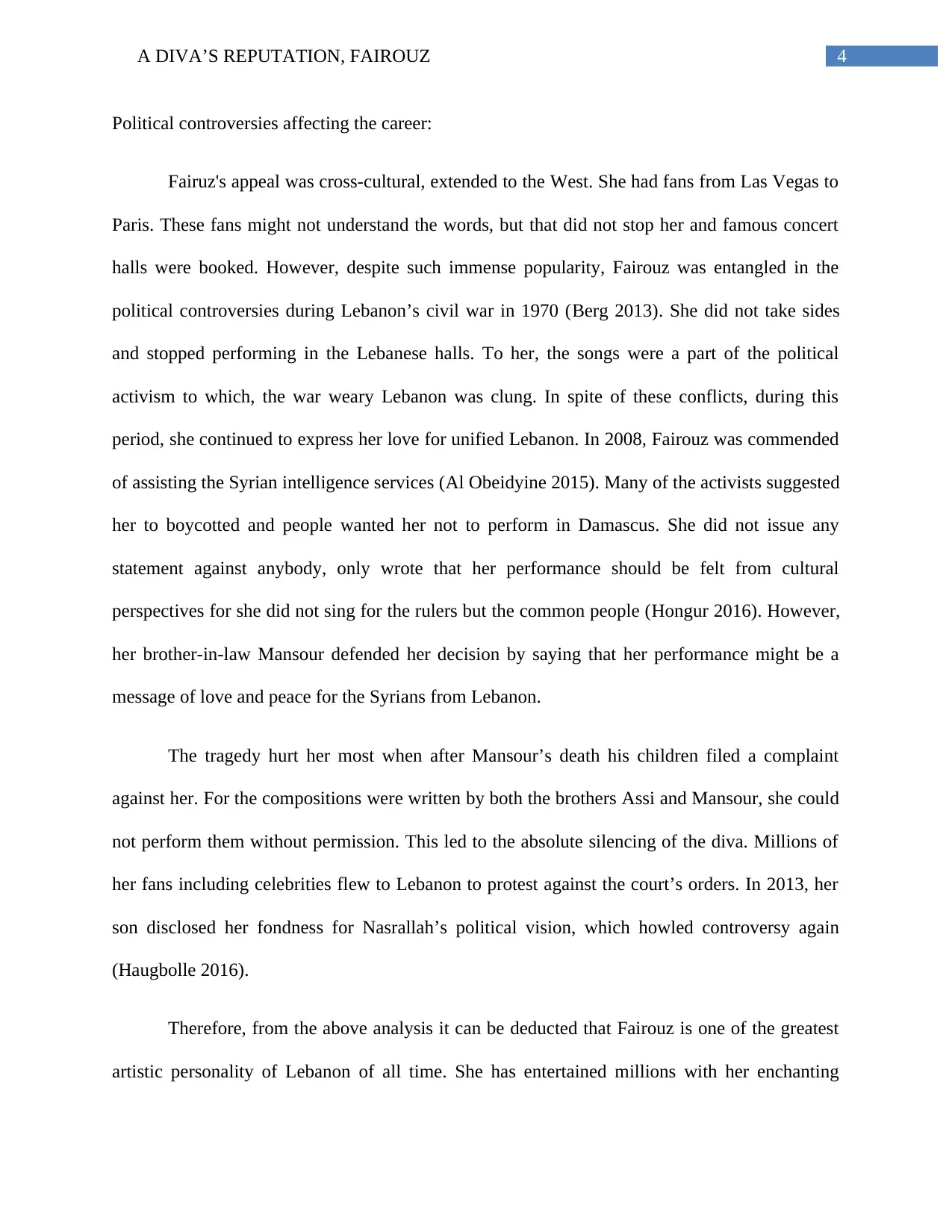
4A DIVA’S REPUTATION, FAIROUZ
Political controversies affecting the career:
Fairuz's appeal was cross-cultural, extended to the West. She had fans from Las Vegas to
Paris. These fans might not understand the words, but that did not stop her and famous concert
halls were booked. However, despite such immense popularity, Fairouz was entangled in the
political controversies during Lebanon’s civil war in 1970 (Berg 2013). She did not take sides
and stopped performing in the Lebanese halls. To her, the songs were a part of the political
activism to which, the war weary Lebanon was clung. In spite of these conflicts, during this
period, she continued to express her love for unified Lebanon. In 2008, Fairouz was commended
of assisting the Syrian intelligence services (Al Obeidyine 2015). Many of the activists suggested
her to boycotted and people wanted her not to perform in Damascus. She did not issue any
statement against anybody, only wrote that her performance should be felt from cultural
perspectives for she did not sing for the rulers but the common people (Hongur 2016). However,
her brother-in-law Mansour defended her decision by saying that her performance might be a
message of love and peace for the Syrians from Lebanon.
The tragedy hurt her most when after Mansour’s death his children filed a complaint
against her. For the compositions were written by both the brothers Assi and Mansour, she could
not perform them without permission. This led to the absolute silencing of the diva. Millions of
her fans including celebrities flew to Lebanon to protest against the court’s orders. In 2013, her
son disclosed her fondness for Nasrallah’s political vision, which howled controversy again
(Haugbolle 2016).
Therefore, from the above analysis it can be deducted that Fairouz is one of the greatest
artistic personality of Lebanon of all time. She has entertained millions with her enchanting
Political controversies affecting the career:
Fairuz's appeal was cross-cultural, extended to the West. She had fans from Las Vegas to
Paris. These fans might not understand the words, but that did not stop her and famous concert
halls were booked. However, despite such immense popularity, Fairouz was entangled in the
political controversies during Lebanon’s civil war in 1970 (Berg 2013). She did not take sides
and stopped performing in the Lebanese halls. To her, the songs were a part of the political
activism to which, the war weary Lebanon was clung. In spite of these conflicts, during this
period, she continued to express her love for unified Lebanon. In 2008, Fairouz was commended
of assisting the Syrian intelligence services (Al Obeidyine 2015). Many of the activists suggested
her to boycotted and people wanted her not to perform in Damascus. She did not issue any
statement against anybody, only wrote that her performance should be felt from cultural
perspectives for she did not sing for the rulers but the common people (Hongur 2016). However,
her brother-in-law Mansour defended her decision by saying that her performance might be a
message of love and peace for the Syrians from Lebanon.
The tragedy hurt her most when after Mansour’s death his children filed a complaint
against her. For the compositions were written by both the brothers Assi and Mansour, she could
not perform them without permission. This led to the absolute silencing of the diva. Millions of
her fans including celebrities flew to Lebanon to protest against the court’s orders. In 2013, her
son disclosed her fondness for Nasrallah’s political vision, which howled controversy again
(Haugbolle 2016).
Therefore, from the above analysis it can be deducted that Fairouz is one of the greatest
artistic personality of Lebanon of all time. She has entertained millions with her enchanting

5A DIVA’S REPUTATION, FAIROUZ
voice, emotional appeal and passion for united Lebanon. The diva never uttered a single word in
her defense even when she was accused of anti-nationalism. Despite she was banned in her own
country, Lebanon was always present in her heart and music.
voice, emotional appeal and passion for united Lebanon. The diva never uttered a single word in
her defense even when she was accused of anti-nationalism. Despite she was banned in her own
country, Lebanon was always present in her heart and music.
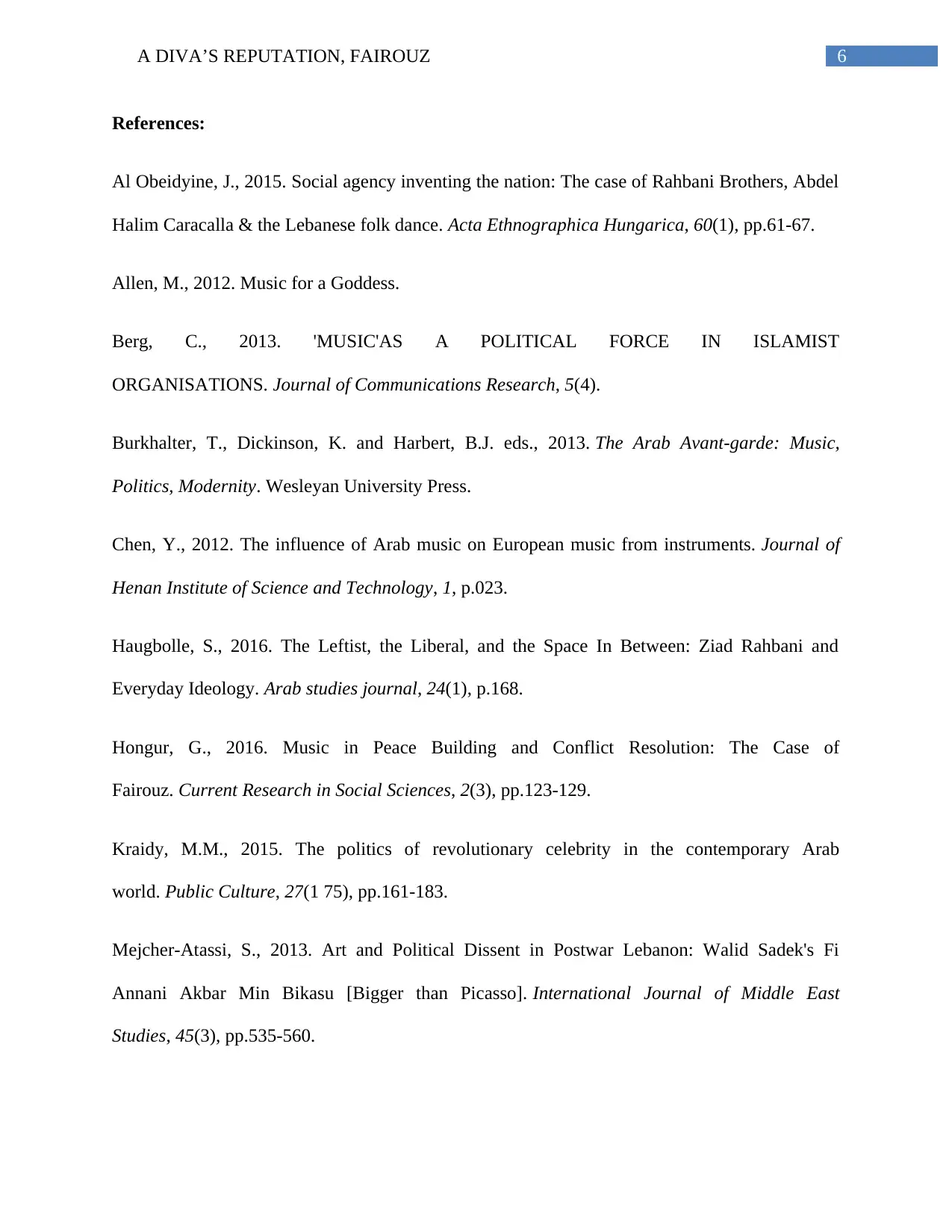
6A DIVA’S REPUTATION, FAIROUZ
References:
Al Obeidyine, J., 2015. Social agency inventing the nation: The case of Rahbani Brothers, Abdel
Halim Caracalla & the Lebanese folk dance. Acta Ethnographica Hungarica, 60(1), pp.61-67.
Allen, M., 2012. Music for a Goddess.
Berg, C., 2013. 'MUSIC'AS A POLITICAL FORCE IN ISLAMIST
ORGANISATIONS. Journal of Communications Research, 5(4).
Burkhalter, T., Dickinson, K. and Harbert, B.J. eds., 2013. The Arab Avant-garde: Music,
Politics, Modernity. Wesleyan University Press.
Chen, Y., 2012. The influence of Arab music on European music from instruments. Journal of
Henan Institute of Science and Technology, 1, p.023.
Haugbolle, S., 2016. The Leftist, the Liberal, and the Space In Between: Ziad Rahbani and
Everyday Ideology. Arab studies journal, 24(1), p.168.
Hongur, G., 2016. Music in Peace Building and Conflict Resolution: The Case of
Fairouz. Current Research in Social Sciences, 2(3), pp.123-129.
Kraidy, M.M., 2015. The politics of revolutionary celebrity in the contemporary Arab
world. Public Culture, 27(1 75), pp.161-183.
Mejcher-Atassi, S., 2013. Art and Political Dissent in Postwar Lebanon: Walid Sadek's Fi
Annani Akbar Min Bikasu [Bigger than Picasso]. International Journal of Middle East
Studies, 45(3), pp.535-560.
References:
Al Obeidyine, J., 2015. Social agency inventing the nation: The case of Rahbani Brothers, Abdel
Halim Caracalla & the Lebanese folk dance. Acta Ethnographica Hungarica, 60(1), pp.61-67.
Allen, M., 2012. Music for a Goddess.
Berg, C., 2013. 'MUSIC'AS A POLITICAL FORCE IN ISLAMIST
ORGANISATIONS. Journal of Communications Research, 5(4).
Burkhalter, T., Dickinson, K. and Harbert, B.J. eds., 2013. The Arab Avant-garde: Music,
Politics, Modernity. Wesleyan University Press.
Chen, Y., 2012. The influence of Arab music on European music from instruments. Journal of
Henan Institute of Science and Technology, 1, p.023.
Haugbolle, S., 2016. The Leftist, the Liberal, and the Space In Between: Ziad Rahbani and
Everyday Ideology. Arab studies journal, 24(1), p.168.
Hongur, G., 2016. Music in Peace Building and Conflict Resolution: The Case of
Fairouz. Current Research in Social Sciences, 2(3), pp.123-129.
Kraidy, M.M., 2015. The politics of revolutionary celebrity in the contemporary Arab
world. Public Culture, 27(1 75), pp.161-183.
Mejcher-Atassi, S., 2013. Art and Political Dissent in Postwar Lebanon: Walid Sadek's Fi
Annani Akbar Min Bikasu [Bigger than Picasso]. International Journal of Middle East
Studies, 45(3), pp.535-560.
Paraphrase This Document
Need a fresh take? Get an instant paraphrase of this document with our AI Paraphraser
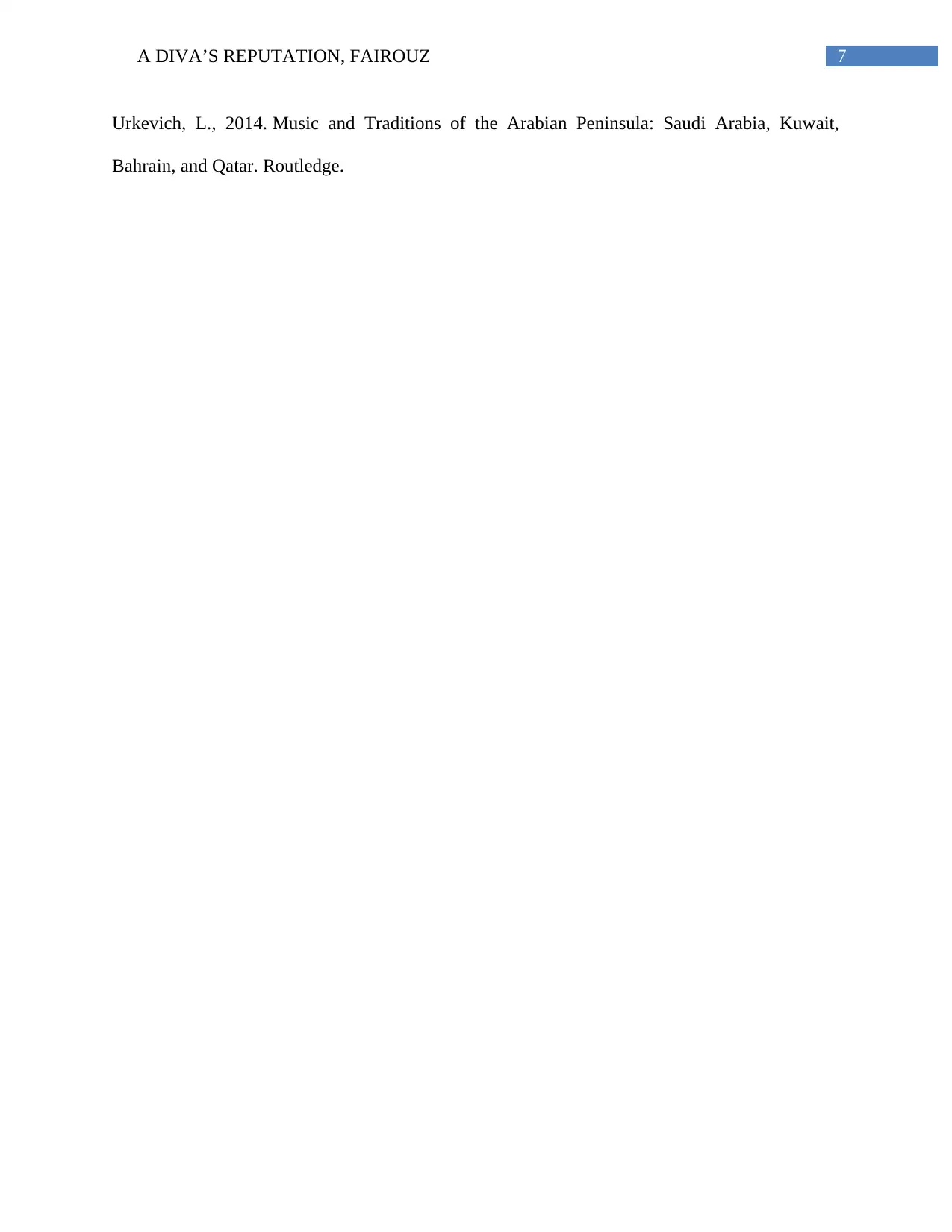
7A DIVA’S REPUTATION, FAIROUZ
Urkevich, L., 2014. Music and Traditions of the Arabian Peninsula: Saudi Arabia, Kuwait,
Bahrain, and Qatar. Routledge.
Urkevich, L., 2014. Music and Traditions of the Arabian Peninsula: Saudi Arabia, Kuwait,
Bahrain, and Qatar. Routledge.
1 out of 8
Related Documents
Your All-in-One AI-Powered Toolkit for Academic Success.
+13062052269
info@desklib.com
Available 24*7 on WhatsApp / Email
![[object Object]](/_next/static/media/star-bottom.7253800d.svg)
Unlock your academic potential
© 2024 | Zucol Services PVT LTD | All rights reserved.
